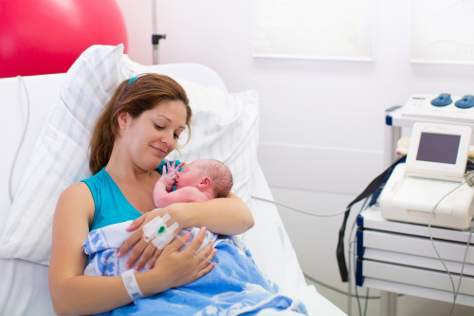Description: No matter how long you’re in labor, your body will need several weeks and some efforts from you to recover fully. Get to know all the essential info about postpartum care for new moms. Our experts provide you with their top tips.

As a mom-to-be, you’ve probably bought everything and even more for your coming little! Baby care products, a crib, a stroller, baby clothes – let’s be honest, getting ready for newborn’s arrival wasn’t too hard. There’s no shortage resources for moms-to-be on what to buy and how to care for their newborns. However, the crucial conversation about what moms should expect during their postpartum recovery is still somewhat taboo. In fact, this FridaMom ad was banned from airing during the Academy Awards in 2020 because it was “too graphic” in its honest and realistic portrayal of what women experience after childbirth. While most future mommies are sure they buy the best nursing pads, the best breast pump and the best postpartum belly wrap, which of course are important purchases in preparation for the “fourth trimester,” candid information for new moms about what to expect or how to self-care after labor is sorely lacking.
So let’s talk postpartum care. The first six weeks after childbirth are considered the postpartum period. And no matter if you’ve had a C-section or vaginal birth, whether it’s your first child or your fifth, your body will have gone through a major ordeal, and it’ll need some TLC. Every mom’s experience will be different, and depending on a number of factors, full recovery from labor may take from several weeks up to several months. Taking good care of yourself during this time will help you recover faster and smoother.
What is postpartum care?
Postpartum care involves a daily routine of providing special attention and treatment to the vagina, perineum, rectum, and breasts after childbirth. Now, that you know the postpartum care definition and how such care can impact your recovery, let’s move further and get to know some essential info and tips from new moms and doctors.
What can I expect to happen to my body after childbirth?
Vaginal discharge
It’s completely normal to have vaginal discharge and bleeding for up to several weeks after childbirth. This is your body’s way of throwing off extra tissue and blood from the uterus. During the first few days, you’ll notice bright red blood, gradually, it’ll turn to pinkish, brownish, after that yellow, creamy, and then it will disappear.
What to do: Be patient and stock up with the best postpartum pads. After several days the bleeding will lessen and you’ll be able to switch to ordinary feminine pads which might feel more comfortable.
Perineal soreness and swelling
Perineum – the area between vagina and rectum – might stretch and tear during labor, which means, even if you don’t have an episiotomy, it’ll swell and hurt. What’s an episiotomy, you ask? That is a small cut made to widen the vagina to allow the child to come out a little easier. Of course, the incision will be stitched up, which can cause a additional discomfort and itching as the wound heals.
What to do: Postpartum perineal care includes sitting on a pillow instead of a hard surface. From time to time, place an ice pack on the area to ease swelling and pain. When you use the restroom, use a squirt bottle with lukewarm water to keep the sore area clean and always wipe from front to back, which helps to avoid infection. You can also use witch hazel pads to soothe and protect the area (such as Tucks Medicated Cooling Pads), which can give you some immediate relief.
Constipation
Your system will be in slow-mo for the first week postpartum. Now, add to that the fear of ripping your stitches plus common side effects from your epidural or other pain medication, the thought of going number two could be your number one concern. In fact, it’s very common for new moms to have some constipation after childbirth, which can last from a a few days to a few months.
What to do: The first step is to eat foods that are rich in fiber and make sure to drink lots of water. Your hospital or birthing center will most likely recommend a stool softener – one without a stimulant that will be safe if you are breastfeeding. It’s also important to remember that bearing down is great for pushing out a baby, but not for that first poop. Take it slow and gentle, especially for the first week.
Many women also develop hemorrhoids after childbirth, either from the constipation or pushing during labor. Using the witch hazel pads recommended above can also help relieve the itching and pain from hemorrhoids. If this treatment doesn’t work for you, consult your physician.
Breast and nipple soreness
Up to the first five days after childbirth, your breasts produce colostrum – a nutrient-rich liquid that helps to boost the baby’s immune system. Colostrum is thick and yellow, not the white milk you may expect. After a few days your milk will transition from first milk (colostrum) to mature milk, your breasts will swell as they begin to produce breast milk and it’s during this time and through the first two weeks that your supply increases. When your breasts are full, or engorged, it can be quite uncomfortable and you may have sore or cracked nipples from of your baby’s suckling.
What to do: Postpartum breast care is quite simple. To reduce nipple soreness, try a nipple cream that is safe for you and your little one; you won’t have to wash it off before breastfeeding. As for the discomfort from engorged breasts, nursing your little one will ease swelling and tenderness. After a week or two, your nipples and breasts will adjust to your new situation.

Baby Blues
Lots of women – if not all – go through a roller coaster of emotions after they bring the baby home. You may experience worry, fatigue, anxiety; you may even laugh happily and in a minute desperately cry – it’s normal in the early days of motherhood. These mood changes are caused by hormonal fluctuations that occur after birth. Day three can be especially difficult, as “the birth buzz is wearing off, estrogen and progesterone levels are dropping off, and prolactin and oxytocin levels rise and fall throughout the day while the baby suckles,” says Jocelyn Brown, a licensed and certified midwife in Los Angeles. Just know these hormones will begin to balance out in a couple of weeks.
What to do: Eat well and rest as much as possible. It’s great if you can rely on your partner and family members – don’t even try to cope with everything alone. You really need help during this period! Just know it’s normal to feel exhausted and overwhelmed. However, if you’re feeling overcome with sadness and anxiety — if you can’t eat or sleep, aren’t bonding with your newborn, or are having suicidal thoughts or thoughts of hurting anyone else — talk to your doctor. Postpartum Depression (PPD) is a more serious condition and requires medical intervention.
About the author
Rachel Burns is an experienced copywriter and photographer with a design diploma. She works with startups, entrepreneurs, bloggers and companies from around the world. In addition to writing articles and promotional materials, she enjoys hiking, reading, cooking and spending time with her family.





